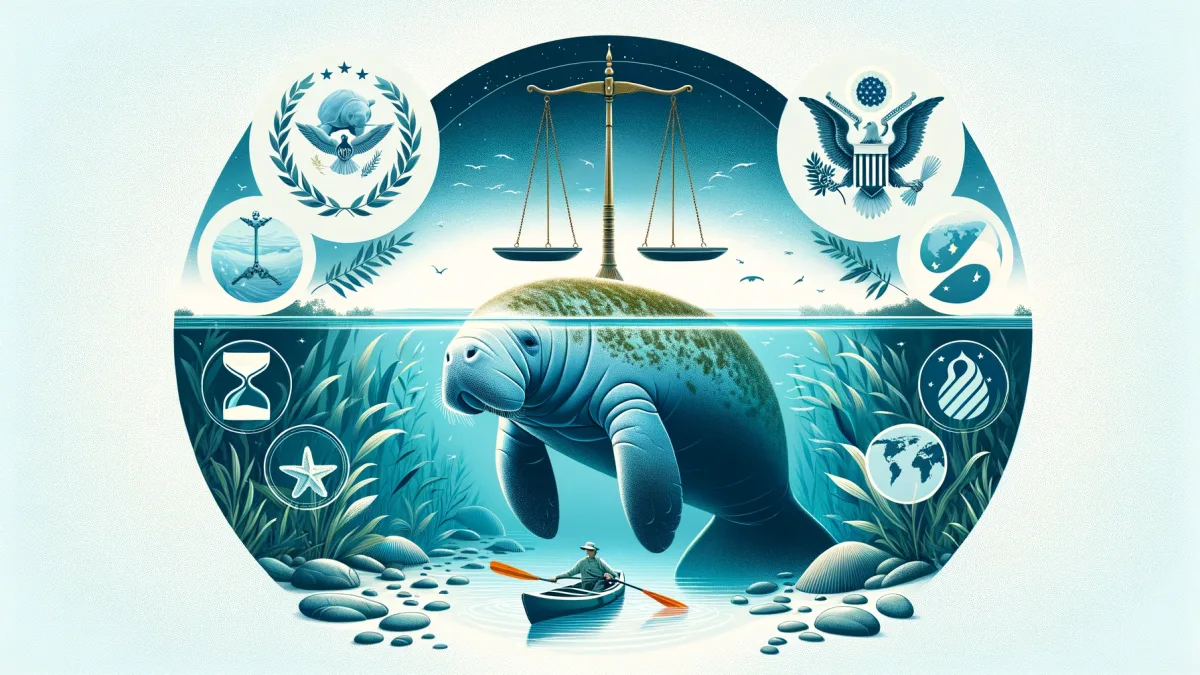Hey there, wildlife enthusiasts and law aficionados! Have you ever been tempted to reach out and touch a manatee while exploring Florida’s waterways? These gentle sea cows, with their slow movements and curious nature, can make it tempting. But before you extend that hand, let’s dive into the legal implications of petting a manatee in the United States. Spoiler alert: It’s a topic as layered as the ecosystems these creatures inhabit.
Understanding the Legal Protections
Manatees are protected under both federal and state laws due to their status as an endangered species. The primary pieces of legislation you need to be aware of are the Marine Mammal Protection Act (MMPA) of 1972 and the Endangered Species Act (ESA) of 1973, as well as specific Florida state laws designed to protect these marine mammals.
Keyword Spotlight: “Marine Mammal Protection Act” and “Endangered Species Act”
The MMPA prohibits the “take” of marine mammals in U.S. waters and by U.S. citizens on the high seas, and “take” is defined broadly to include harassment, hunting, capturing, or killing. The ESA provides similar protections to species listed as endangered or threatened, aiming to conserve their habitats and prevent extinction. Under these acts, petting a manatee could be considered harassment, as it disrupts their natural behavior and can lead to stress or injury.
Florida’s Manatee Sanctuary Act
In addition to federal laws, the Florida Manatee Sanctuary Act specifically declares the state a refuge and sanctuary for manatees, making it illegal to annoy, molest, harass, or disturb any manatee. Yes, “disturb” can include petting, feeding, or any other interaction that alters their natural behavior.
The Intent Behind the Legislation
The laws protecting manatees are grounded in the need to preserve these unique creatures for future generations. Human interactions, even seemingly benign ones like petting, can have significant consequences. Manatees need to conserve their energy for migration, feeding, and avoiding natural predators, and human interaction can interfere with these essential behaviors.
What Constitutes Harassment?
Harassment isn’t limited to aggressive or harmful actions. It includes any act that can potentially disrupt a manatee’s natural state. This means swimming too close, chasing, or attempting to feed manatees can all be considered forms of harassment.
The Consequences of Non-Compliance
Violating the MMPA, ESA, or Florida’s Manatee Sanctuary Act can result in hefty fines, legal penalties, and even imprisonment for severe offenses. The U.S. Fish and Wildlife Service and the Florida Fish and Wildlife Conservation Commission actively enforce these laws to protect manatees.
Ethical Wildlife Watching: How to Enjoy Manatees Responsibly
The good news is that you can still enjoy the presence of these majestic creatures without breaking the law or putting them at risk:
- Observe from a Distance: Use binoculars or a kayak to watch manatees without intruding on their space.
- Follow Viewing Guidelines: Stick to designated manatee viewing areas and adhere to the guidelines provided by wildlife officials.
- Educate Yourself and Others: Understanding the importance of these laws can help foster a culture of respect and conservation.
Final Thoughts: Respect Our Marine Mammals
The allure of interacting with manatees is understandable, but the responsibility to protect them is paramount. By respecting legal boundaries and practicing ethical wildlife viewing, we can ensure that manatees continue to thrive in their natural habitats. Remember, conservation isn’t just about laws; it’s about fostering a deep respect for the natural world and its inhabitants.









Leave a Reply